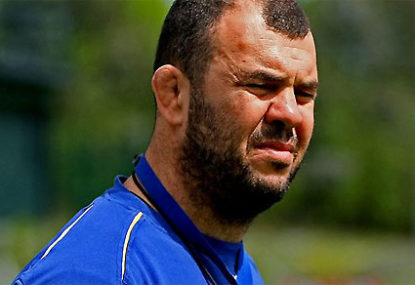After both the Waratahs and Reds had been defeated over the weekend I had an interesting discussion with a mate debating the culpability of coaches for poor performances.
My mate is a passionate Reds fan who believes Richard Graham is responsible for the Reds woes and should be sacked immediately.
I argued that while it’s obvious something is wrong, I see no evidence of poor coaching at the Reds and that it’s an over simplification to say it’s all the coach’s fault.
It was a lengthy discussion that ultimately ended without agreement.
There are four areas coaches are responsible for: personnel (recruitment, retention and selection), tactical, technical and mental.
The personnel area is solely the responsibility of the coach. The tactical is primarily the responsibility of the coach but it is still up to the players to implement the game plan, so players bear a large part of the responsibility as well.
The technical area is largely the responsibility of the players. The coach may decide what to work on in training and is responsible for teaching players and advising them technically, but it is the players on the field who either execute a skill or don’t.
The mental aspect of the game is the hardest to apportion responsibility for. The coach tries to get his players in a state of mind to perform well.
Sometimes that requires a chest thumping speech as we often see coaches giving in the change rooms, sometimes it requires a quiet word to a player to help improve their self confidence or to focus them on a key issue for a specific match. Sometimes the coaches can have no impact on a player’s mental state.
The mental aspect is also the hardest to make judgements regarding. Did a player drop the ball because of poor skills or a lack of confidence? Did a player fail to follow a game plan because the plan was too complicated or because of nerves?
The Force are currently playing well – is that because Michael Foley has got his selections right or the Force off field staff are better with the mental area of the game?
Are the Reds struggling because their coaches are not selecting the right team or is it because the technical work they’re doing with the team isn’t good enough?
Are the Waratahs making so many mistakes on-field because Michael Cheika is trying to implement a game plan that is too ambitious, or are the players low on confidence?
I’m afraid I don’t have any answers for you on those questions. What I do know is that it isn’t as simple as many people make out when they say coaches are the problem when a team isn’t performing.
However there are obviously times when the coaches are the problem and if a team isn’t performing the coaches wear the responsibility for that, whether it is clear they are the problem or not. That’s the way it’s always been and always will be.
If you were coaching the Waratahs or Reds, what would you do this week to try and address the technical issues arising from their performances over the weekend? I’ve outlined just a few of the problems that need addressing for each team below.
Let’s start with the Waratahs and look at their bumbling performance against the Blues. After starting the season so well, the Waratahs have been doing a great job of shooting themselves in the foot in the last month or so.
Cheika has them playing an expansive game plan and taking plenty of risks. They’re creating plenty of opportunities but are butchering many of them with poor decision making and poor skill execution.
Many people seem to have the view that Kurtley Beale is a big part of the problem, as he’s trying to do too much on his own and is not allowing Bernard Foley to run the attack – something he did so well last season.
This is one of many recent examples where Beale runs across field and does try to do too much.
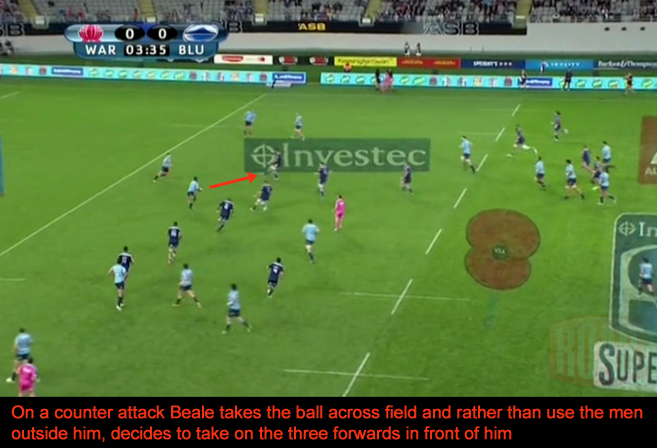
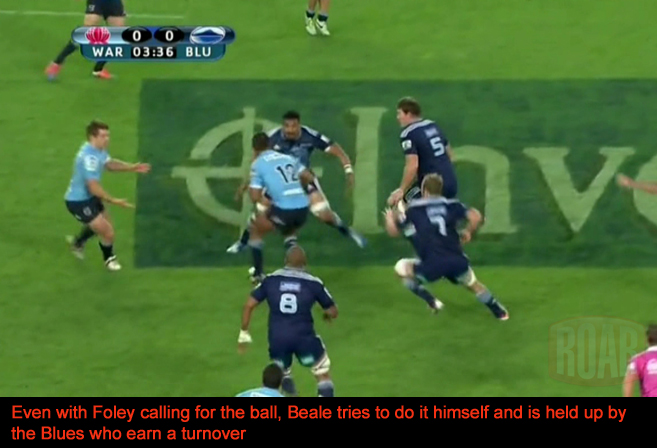
But it’s not just Beale who has made some poor recent decisions. Here’s an example where Israel Folau chose not to pass until he’d gone into contact. Sometimes it’s necessary to go into contact before offloading to open up a hole, but it wasn’t in this case. All he succeeded in doing was trying to force a pass in contact, which went forward.
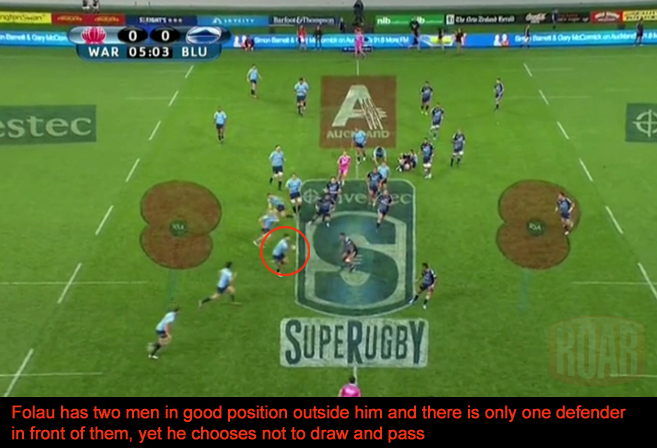
Nick Phipps got into space late in the second half and had Potgieter and Crawford in support. He chose to hold on to the ball too long so that by the time he tried to pass, all he managed to do was throw it straight to a Blues player.
Potgieter didn’t help by staying out wide – he should have changed angle to run into the hole between the two defenders which would have allowed Phipps to make a short pass.
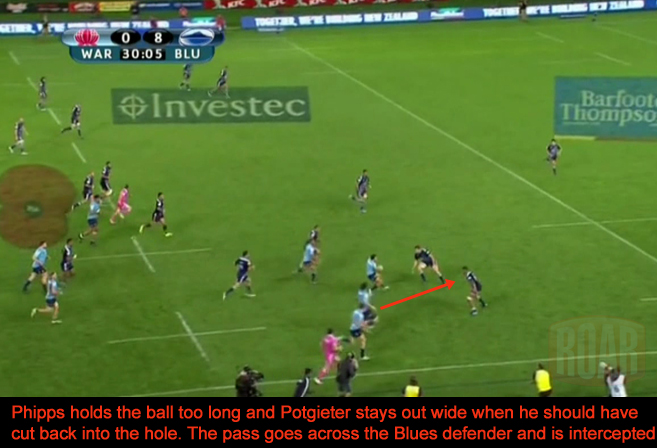
Minutes later Foley blew an even better opportunity. From the position you can see in the image below all he had to do was execute a pretty simple pass and Crawford was in space down the touch line with a very good chance to score.
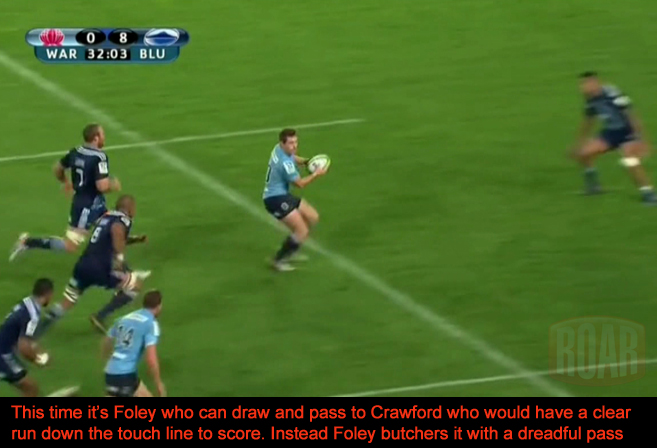
The pass was thrown well in front of Crawford who somehow managed to dive forward and catch it but the opportunity was lost because of a basic failure of skills under pressure.
It’s no secret that the Waratahs lineout has struggled in recent times, so I imagine they are spending plenty of time at training on getting it right. But somehow in this match they managed to make a mistake that a suburban team would be embarrassed about.
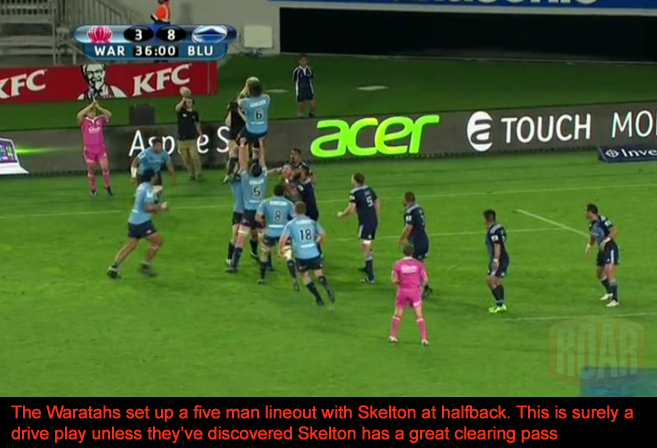
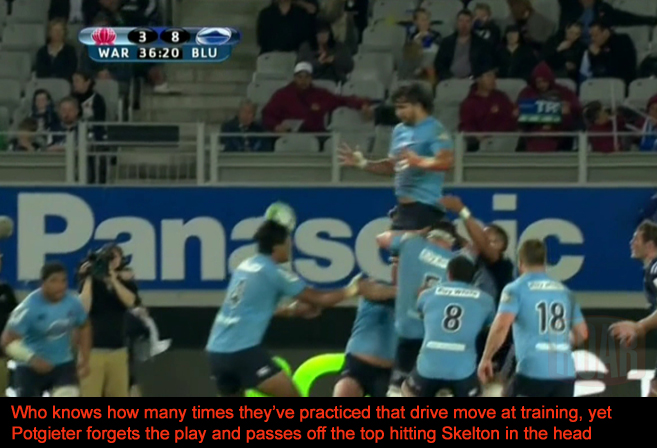
This is not an isolated match. The Waratahs have made a lot of basic errors this season.
Let’s look at the Reds performance against the Hurricanes.
The Reds didn’t make anywhere near the number of handling errors the Waratahs did, but they made many more defensive errors.
Corey Jane scored a hat trick while opposed by rookie winger Jamie-Jerry Taulagi. In the lead up to the first try Taulagi was turned towards Jane as you can see in the image below. However, once Andre Taylor got outside Jake Schatz he came in to defend Taylor who passed out to Jane.
Both Schatz and Taulagi were at fault here.
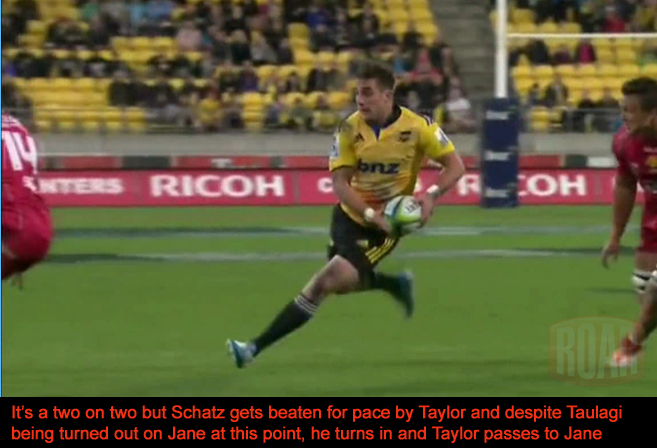
On the next Jane try, the Reds got caught short on that side of the field and it became a pretty simple catch, draw and pass situation for the Hurricanes.
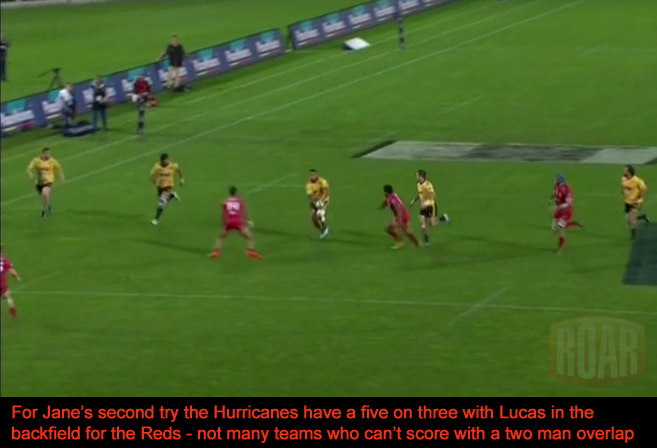
The Reds got caught short again on the same side of the field when Jane scored his third try. While it’s easy to look at Jane scoring three tries and blame the Reds winger, there’s a bigger issue here – why were the Reds continually getting caught short for numbers?
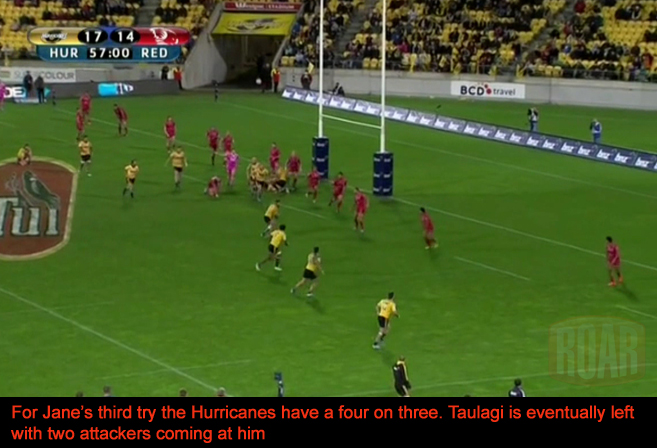
Is there something wrong with the Reds technical work on their defence or are they not fit enough to realign quickly enough?
As you can see in the image below TJ Perenara scored a soft try from about one metre out when Ben Daley stood up on his own line and invited Perenara in. It was a very poor basic defensive error from Daley.
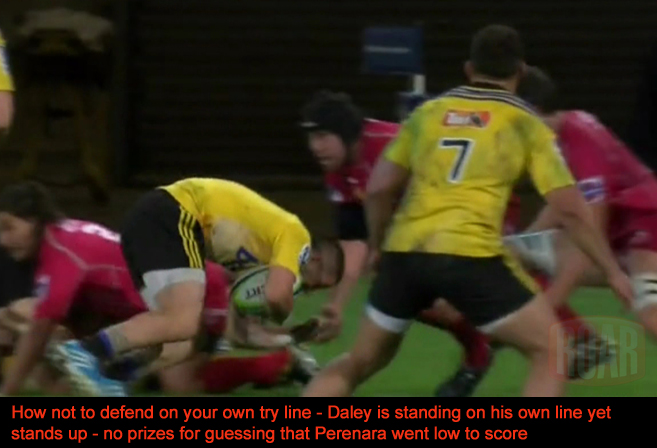
Chris Feauai-Sautia made a basic error of his own when he caught the ball in touch and tried for a quick lineout throw. He caught the ball correctly with a foot in touch but then threw the ball in incorrectly and the referee was correct to pull it up.
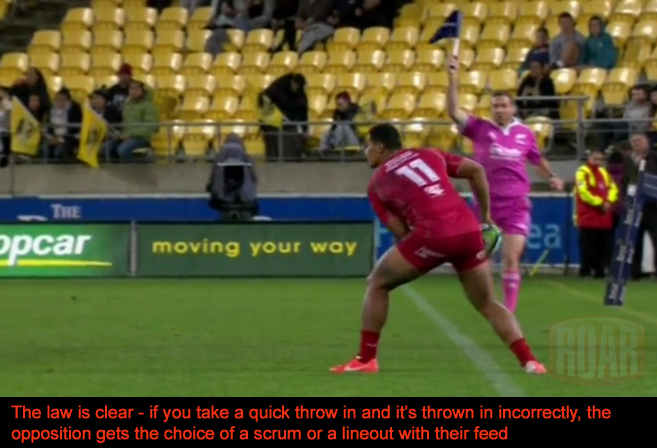
Have the coaches not taught players they must have both feet in touch to make a quick throw in? Do players not know this without having to be told by coaches or was this just an error under pressure?
In one of the worst examples of a brain snap we saw on the weekend, Rob Simmons was put into space by James Slipper with just over ten minutes to go and the Reds trailing by just four points. He had Feauai-Sautia outside him and while there was cover coming across it was a very good chance for the Reds to score a try to take the lead.
All Simmons needed to do was draw and pass. Or alternatively, maybe a kick through would be a better option…
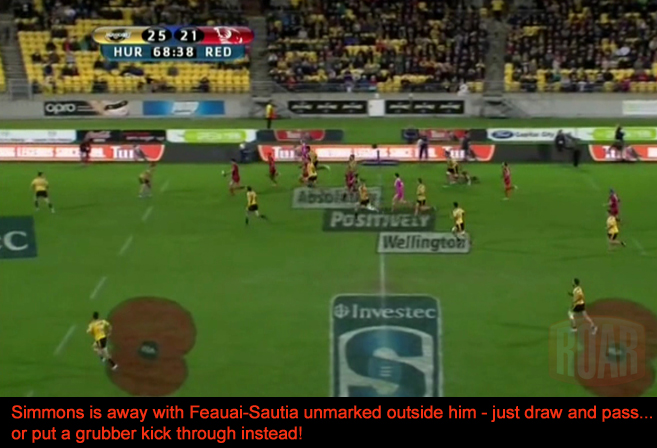
It’s hard to imagine what Simmons was thinking in that example but the kick through was clearly the wrong option and the opportunity was lost.
The incident from this match that many people thought of as a brain snap was Quade Cooper’s decision to try a cross field kick from near the Reds’ try line.
I don’t think anyone will disagree when I say the execution of this kick was very poor as it went backwards over the Reds dead ball line!
But what about the decision making involved – if you were coaching Cooper, what would you say to him about that decision?
If it were me I’d say, “good decision, I’m sure next time you’ll get the execution right!”
I know many of you just spat your coffee all over the keyboard as you read my last statement. But think about it – the Reds had the advantage which is the perfect time to try something radical – you effectively get a free play.
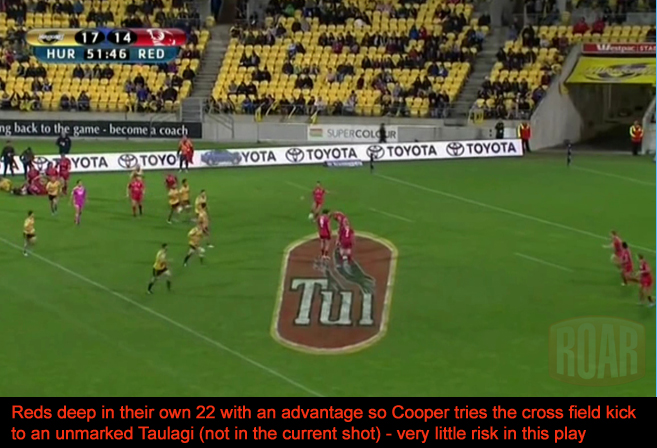
There was space out wide and in the image above you can’t see the Reds winger. What you can see is how narrow the Hurricanes defence was and the forwards on the end of their defensive line.
If Cooper had executed this kick well, there was far more upside possible than just kicking the ball into touch or down field which would have ended the advantage. As it turned out he didn’t execute well and the Reds retained the advantage and were able to exit after a scrum.
So what are Cheika, Graham and their assistants doing to eliminate these and other decision making and skill errors? A better question is probably this – what can they do?
I don’t think training harder or longer is going to fix any of the issues I’ve outlined above. I doubt that the coaches of either team are not competent in coaching the technical aspects of the game. I’m sure they’ve got plenty of different drills they use to try and improve the player’s abilities and I know there are no secret drills coaches can pull out in times like these.
The issues both the Waratahs and Reds are having right now are not technical, they are mental.
How can the coaches lift the confidence of their teams within the week? There’s no one answer for that question and in fact there may be no plausible answer at all.
Sometimes confidence returns all by itself – a player catches a ball they would have dropped a week ago and all of a sudden they catch everything. Sometimes the team needs to go to the pub for a big night!
If you do have the answer to the questions posed here, please share them with all of us here.





























































































